It looks like you're using an Ad Blocker.
Please white-list or disable AboveTopSecret.com in your ad-blocking tool.
Thank you.
Some features of ATS will be disabled while you continue to use an ad-blocker.
share:
I did a search online and I got around 8.8 billion "Earth" like planets in our galaxy. So then I searched for how many galaxies are in our universe
(that we know of/can see) and I got as many as 500 billion. So I rounded up and did 9 billion x 500 billion to figure the amount of planets that we
can see and I got this number. 4.5e+21
I am not a math guy and not the sharpest tool in the shed but can someone tell me what that number is? Is it 4.5 trillion trillion? Thanks!
The numbers are mind boggling and amazing.
Firepiston
I am not a math guy and not the sharpest tool in the shed but can someone tell me what that number is? Is it 4.5 trillion trillion? Thanks!
The numbers are mind boggling and amazing.
Firepiston
edit on 7-6-2014 by FirePiston because: (no reason given)
Doesn't matter and I don't know.
If your trying to insinuate that based on the math we're not alone in the Universe,your wrong.
Other then God, we are the highest form of intelligence out there.
Until humans develop ways to go to other galaxies and planets to sprinkle DNA of different species of plants and animals, there's nothing out there.
Just rocks and gases.
Humans RULE....
If your trying to insinuate that based on the math we're not alone in the Universe,your wrong.
Other then God, we are the highest form of intelligence out there.
Until humans develop ways to go to other galaxies and planets to sprinkle DNA of different species of plants and animals, there's nothing out there.
Just rocks and gases.
Humans RULE....
originally posted by: niceguybob
Doesn't matter and I don't know.
If your trying to insinuate that based on the math we're not alone in the Universe,your wrong.
Other then God, we are the highest form of intelligence out there.
Until humans develop ways to go to other galaxies and planets to sprinkle DNA of different species of plants and animals, there's nothing out there.
Just rocks and gases.
Humans RULE....
Good Lord, that is close minded. Of course we are not alone in the universe, let alone the galaxy. There must be billions upon billions of planets with intelligent life on them.
originally posted by: niceguybob
Doesn't matter and I don't know.
If your trying to insinuate that based on the math we're not alone in the Universe,your wrong.
Other then God, we are the highest form of intelligence out there.
Until humans develop ways to go to other galaxies and planets to sprinkle DNA of different species of plants and animals, there's nothing out there.
Just rocks and gases.
Humans RULE....
Got to be the worse reply on ATS in a while
Of course it matters because the OP is asking a question that needs answering....not that your reply had any sufficient input mind.
OP, I'm not a maths person but I think the number is a lot more than a trillion trillion.
Spiro
edit on 7-6-2014 by Spiro because: someone pinched my dictionary
We are lucky to find ourselves on this one. I really wish we had the means to go check out some others. I want a hot green girlfriend.
a reply to: niceguybobe
Discredit your GOD'S creations? That is by far the most unintelligent response Ive ever heard anywhere. To be that close minded and ignorant of the possibilities that your GOD can only create once...out of all those BILLIONS of other possibilities HE created?
You realize youre not giving your GOD an ounce of credit, or believing he can do any better than our poor excuse for an immature, developing example of "humanity"...
Your GOD would be ashamed that you cant see beyond your monitor or Holy Books and understand that which is before you...and that HE has made.
Discredit your GOD'S creations? That is by far the most unintelligent response Ive ever heard anywhere. To be that close minded and ignorant of the possibilities that your GOD can only create once...out of all those BILLIONS of other possibilities HE created?
You realize youre not giving your GOD an ounce of credit, or believing he can do any better than our poor excuse for an immature, developing example of "humanity"...
Your GOD would be ashamed that you cant see beyond your monitor or Holy Books and understand that which is before you...and that HE has made.
Yep God is the creator.....what do ye think?Hes gonna stop with just one variety?
How egotistical is that?
How egotistical is that?
thats a big number its a Sextillion (Trilliard) or in SI terminology a Zetta
originally posted by: niceguybob
Doesn't matter and I don't know.
If your trying to insinuate that based on the math we're not alone in the Universe,your wrong.
Other then God, we are the highest form of intelligence out there.
Until humans develop ways to go to other galaxies and planets to sprinkle DNA of different species of plants and animals, there's nothing out there.
Just rocks and gases.
Humans RULE....
Must hurt having to endure a religion which goes against WHAT'S RIGHT IN FRONT OF YOUR EYES : )
Also..who taught you all the secrets of the universe? Pater Noster from your neighborhood bible study, because he knows? : )
edit on 6/7/2014
by NoRulesAllowed because: (no reason given)
originally posted by: niceguybob
Doesn't matter and I don't know.
If your trying to insinuate that based on the math we're not alone in the Universe,your wrong.
Other then God, we are the highest form of intelligence out there.
Until humans develop ways to go to other galaxies and planets to sprinkle DNA of different species of plants and animals, there's nothing out there.
Just rocks and gases.
Humans RULE....
If Humans are dominant or intelligent compared to anything else than that would make me sad.. We are far from perfect and need a good butt kickin. And my OP was to understand the vastness of the universe by the numbers. As another poster said, there has to be life elsewhere.
Firepiston
edit on 7-6-2014 by FirePiston because: (no reason given)
originally posted by: FirePiston
I did a search online and I got around 8.8 billion "Earth" like planets in our galaxy. So then I searched for how many galaxies are in our universe (that we know of/can see) and I got as many as 500 billion. So I rounded up and did 9 billion x 500 billion to figure the amount of planets that we can see and I got this number. 4.5e+21
I am not a math guy and not the sharpest tool in the shed but can someone tell me what that number is? Is it 4.5 trillion trillion? Thanks!
The numbers are mind boggling and amazing.
Firepiston
Your numbers are close but the ones the experts came up with based on Kepler data are actually a little bigger than that.
From the Planetary Habitability Lab at Arecibo:
4.2 to 5.3 Trillion for the universe:
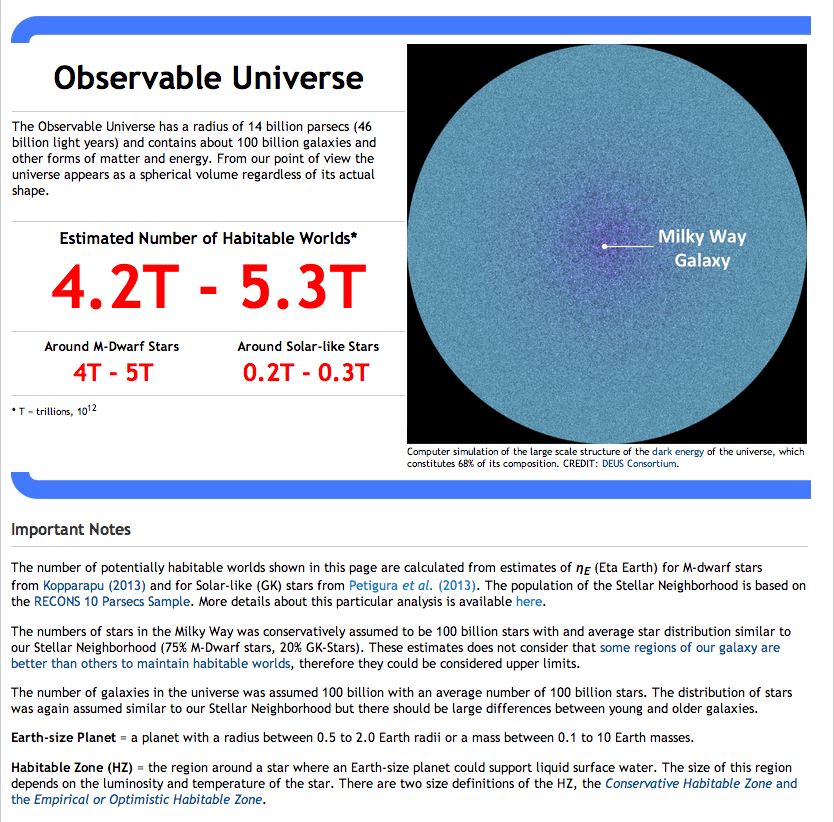
40 to 49 Billion for our Milky Way galaxy:
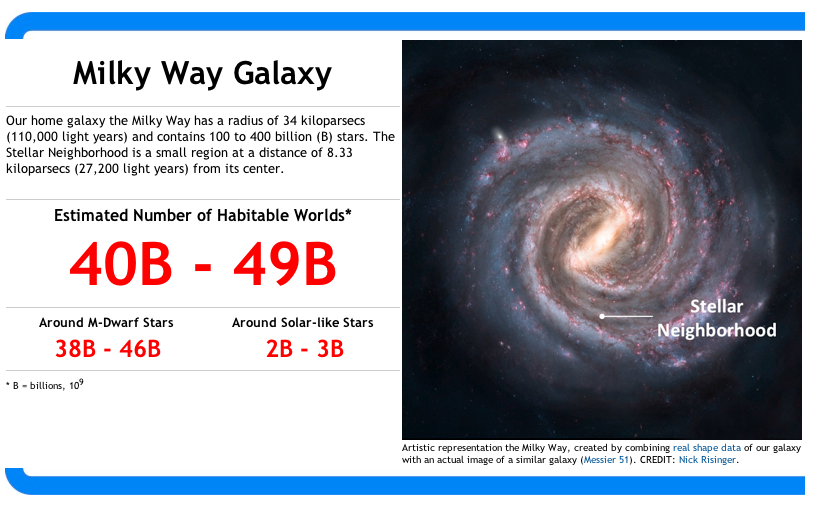
And 132 to 160 in our local neighborhood (Within 32 light years of Earth)
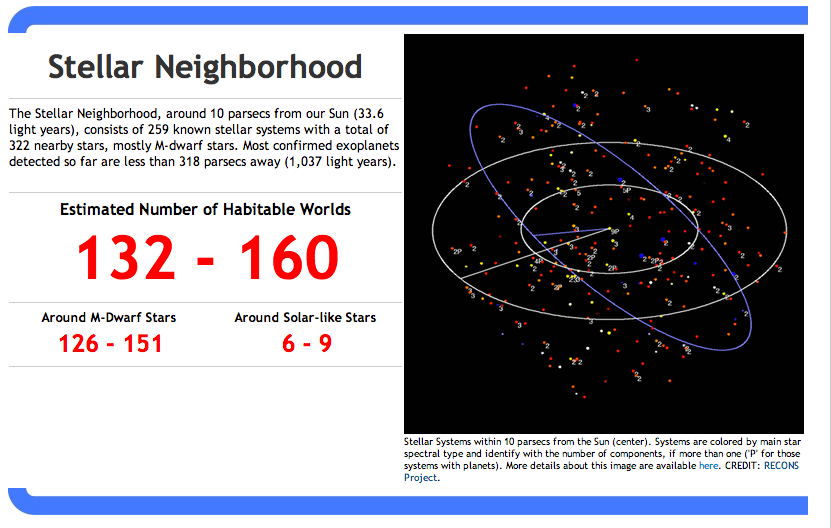
It should be noted these are not simple guesses but estimates based on statistically relevant data from Kepler.
Part of science's usefulness is its predictive power.
Awhile back some astronomers estimated that closest habitable planet to Earth would be within 12 light years:
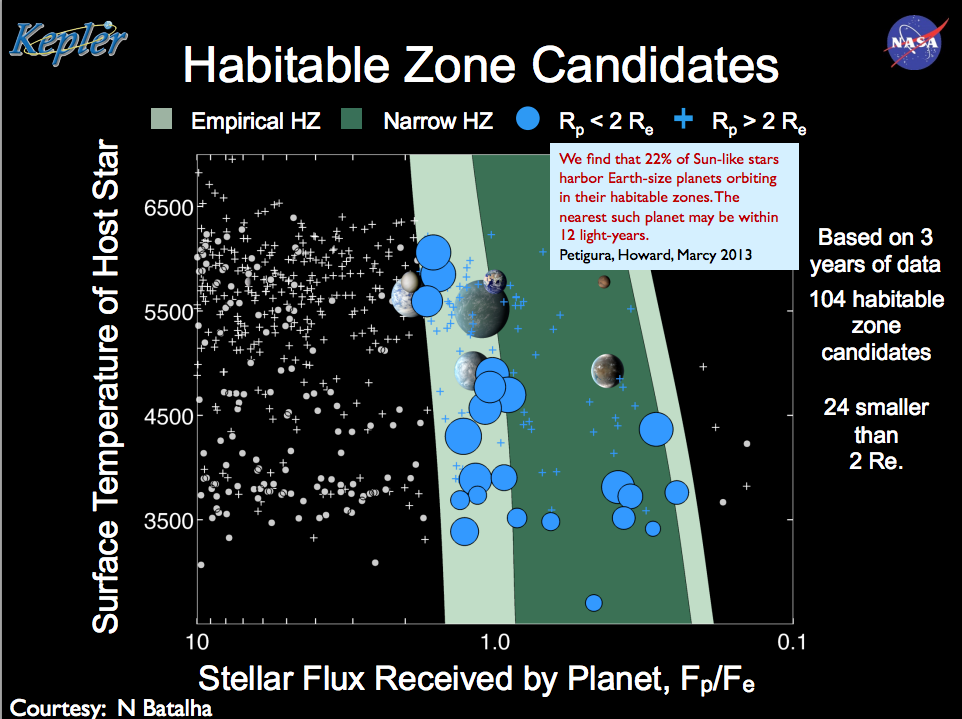
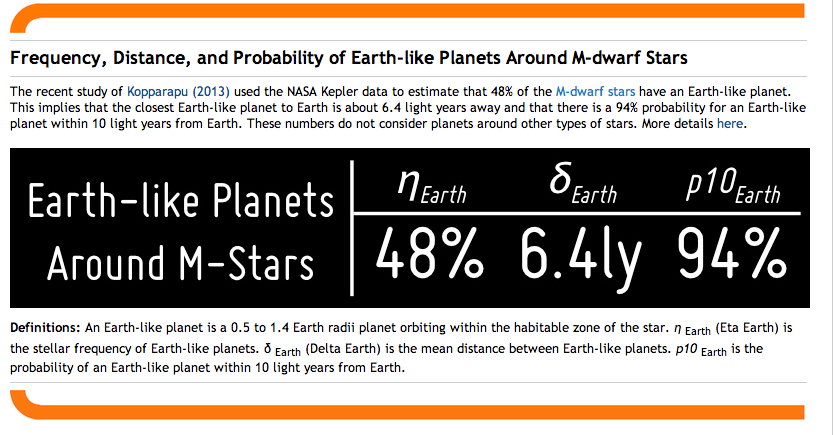
And just this week it was announced that we had found one in the form of Kapteyn B which is just 13 light years away. There's also the unconfirmed planet Tau Ceti e which is just 12 light years away.
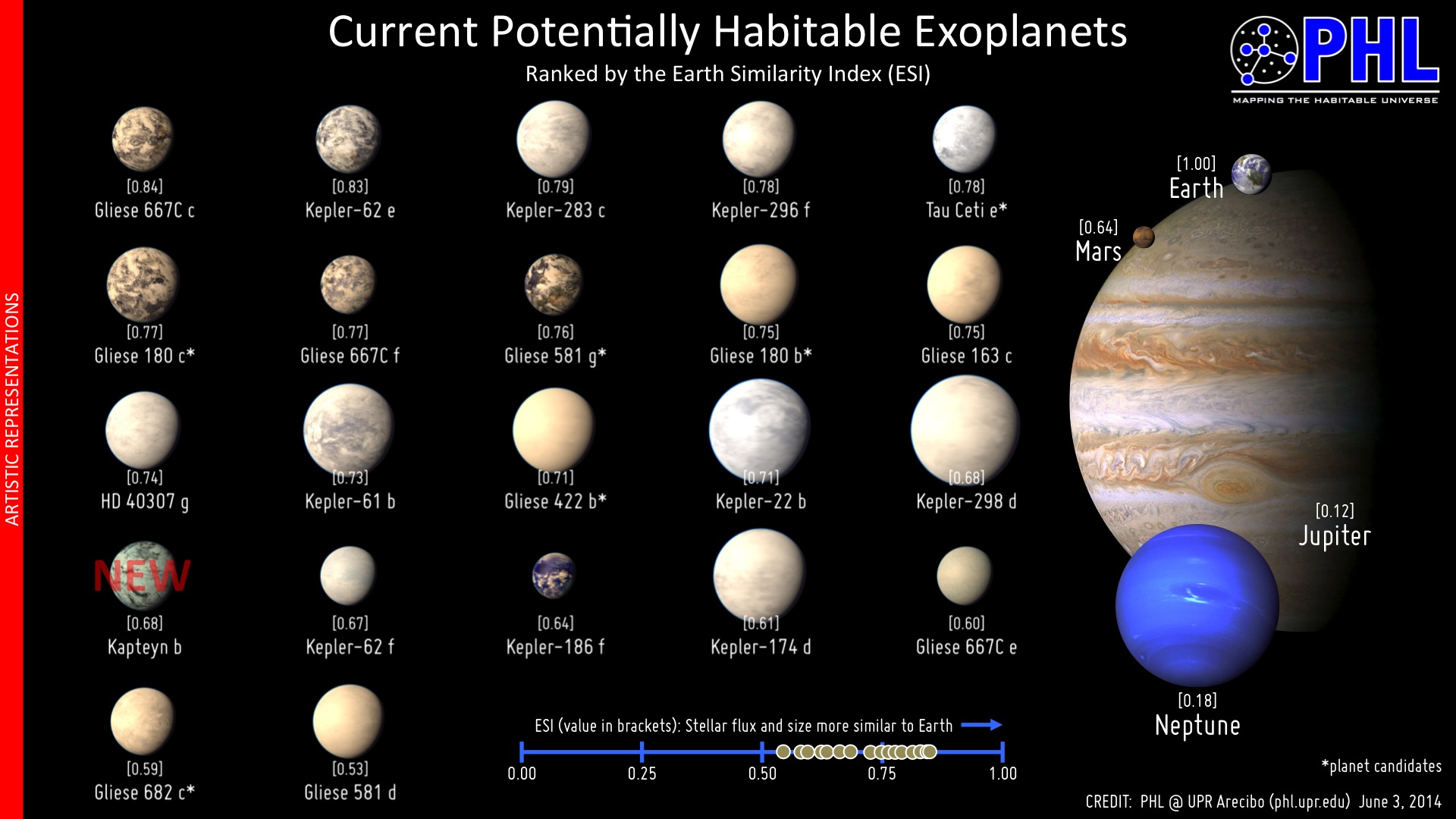
There is a 94% probability of a closer one, less than 10 light years away. Who knows, perhaps it will be around one of the stars of our nearest neighbor, Alpha Centauri. We've already found one planet around Alpha Centauri B but it is not a habitable zone planet.
Typically planets belong to systems so its possible a habitable planet could be lurking around either Alpha Centauri A, Alpha Centauri B or Proxima Centauri.
All three stars are being searched for them and Proxima will get a good look by NASA's followup to Kepler called TESS in 2017.
edit on
7-6-2014 by JadeStar because: (no reason given)
originally posted by: Snarl
a reply to: FirePiston
4,500,000,000,000,000,000,000 (Sextillion) ... but I'm bad at math.
So basically a number that is incomprehensible.. And that is just a number that we could see, meaning it is probably much larger. Amazing. And thanks, also thanks to another poster who answered. Be well!
Firepiston
Amazing reply by Jade, as always.
And yes ours is a "BARRED" spiral galaxy, not a spiral galaxy : ) Love that the image got that right!
And yes ours is a "BARRED" spiral galaxy, not a spiral galaxy : ) Love that the image got that right!
edit on 6/7/2014 by NoRulesAllowed
because: (no reason given)
originally posted by: niceguybob
Doesn't matter and I don't know.
If your trying to insinuate that based on the math we're not alone in the Universe,your wrong.
Other then God, we are the highest form of intelligence out there.
Until humans develop ways to go to other galaxies and planets to sprinkle DNA of different species of plants and animals, there's nothing out there.
Just rocks and gases.
Humans RULE....
I have made some poor posts before but what you say cannot be undone as far as Dee de dee... Do you honestly believe what you say? Just having a bad day or something? I am here to listen... Pm me
Firepiston
originally posted by: NoRulesAllowed
Amazing reply by Jade, as always.
And yes ours is a "BARRED" spiral galaxy, not a spiral galaxy : ) Love that the image got that right!
What do you mean by barred? I learn something new everyday! Please explain.
Firepiston
originally posted by: JadeStar
originally posted by: FirePiston
I did a search online and I got around 8.8 billion "Earth" like planets in our galaxy. So then I searched for how many galaxies are in our universe (that we know of/can see) and I got as many as 500 billion. So I rounded up and did 9 billion x 500 billion to figure the amount of planets that we can see and I got this number. 4.5e+21
I am not a math guy and not the sharpest tool in the shed but can someone tell me what that number is? Is it 4.5 trillion trillion? Thanks!
The numbers are mind boggling and amazing.
Firepiston
Your numbers are close but the ones the experts came up with based on Kepler data are actually a little bigger than that.
From the Planetary Habitability Lab at Arecibo:
4.2 to 5.3 Trillion for the universe:
40 to 49 Billion for our Milky Way galaxy:
And 132 to 160 in our local neighborhood (Within 32 light years of Earth)
It should be noted these are not simple guesses but estimates based on statistically relevant data from Kepler.
Part of science's usefulness is its predictive power.
Awhile back some astronomers estimated that closest habitable planet to Earth would be within 12 light years:
And just this week it was announced that we had found one in the form of Kapteyn B which is just 13 light years away. There's also the unconfirmed planet Tau Ceti e which is just 12 light years away.
There is a 94% probability of a closer one, less than 10 light years away. Who knows, perhaps it will be around one of the stars of our nearest neighbor, Alpha Centauri. We've already found one planet around Alpha Centauri B but it is not a habitable zone planet.
Typically planets belong to systems so its possible a habitable planet could be lurking around either Alpha Centauri A, Alpha Centauri B or Proxima Centauri.
All three stars are being searched for them and Proxima will get a good look by NASA's followup to Kepler called TESS in 2017.
Awesome and thanks that you took the time to post all of this. Good stuff.
Firepiston
a reply to: FirePiston
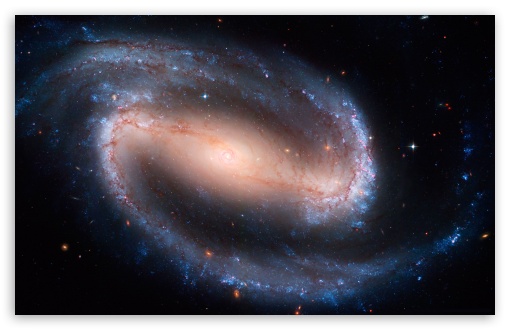
Look in the middle, that horizontal "bar"...which gives it a rather different shape as compared to a spiral galaxy:
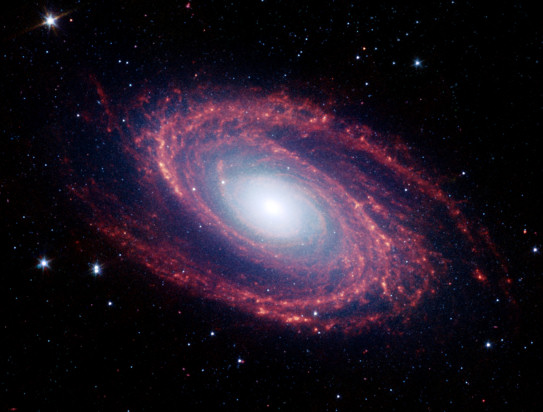

Look in the middle, that horizontal "bar"...which gives it a rather different shape as compared to a spiral galaxy:

edit on 6/7/2014 by NoRulesAllowed because: (no reason given)
originally posted by: NoRulesAllowed
a reply to: FirePiston
Look in the middle, that "bar"...which gives it a very unique shape.
As compared to a spiral galaxy:
I think I see a "bar" but as a whole it still looks like a spiral to me. Thanks for replying.
*Edit* Could it just be the shape that we happen to be in as far as rotational speed?
Firepiston
edit on 7-6-2014 by FirePiston because: (no reason given)
originally posted by: NoRulesAllowed
Amazing reply by Jade, as always.
And yes ours is a "BARRED" spiral galaxy, not a spiral galaxy : ) Love that the image got that right!
Yeah, its a distinction only us space geeks typically care about but its still cringe worthy when the mainstream media (sometimes even mainstream popular science media) get it wrong
edit on 7-6-2014 by JadeStar because: (no reason given)
new topics
-
BIDEN Admin Begins Planning For January 2025 Transition to a New President - Today is 4.26.2024.
2024 Elections: 3 hours ago -
Big Storms
Fragile Earth: 5 hours ago -
Where should Trump hold his next rally
2024 Elections: 7 hours ago -
Shocking Number of Voters are Open to Committing Election Fraud
US Political Madness: 8 hours ago -
Gov Kristi Noem Shot and Killed "Less Than Worthless Dog" and a 'Smelly Goat
2024 Elections: 9 hours ago -
Falkville Robot-Man
Aliens and UFOs: 9 hours ago -
James O’Keefe: I have evidence that exposes the CIA, and it’s on camera.
Whistle Blowers and Leaked Documents: 10 hours ago -
Australian PM says the quiet part out loud - "free speech is a threat to democratic dicourse"...?!
New World Order: 11 hours ago -
Ireland VS Globalists
Social Issues and Civil Unrest: 11 hours ago
top topics
-
James O’Keefe: I have evidence that exposes the CIA, and it’s on camera.
Whistle Blowers and Leaked Documents: 10 hours ago, 17 flags -
Australian PM says the quiet part out loud - "free speech is a threat to democratic dicourse"...?!
New World Order: 11 hours ago, 15 flags -
Blast from the past: ATS Review Podcast, 2006: With All Three Amigos
Member PODcasts: 14 hours ago, 13 flags -
Biden "Happy To Debate Trump"
2024 Elections: 12 hours ago, 13 flags -
Ireland VS Globalists
Social Issues and Civil Unrest: 11 hours ago, 10 flags -
Mike Pinder The Moody Blues R.I.P.
Music: 14 hours ago, 8 flags -
BIDEN Admin Begins Planning For January 2025 Transition to a New President - Today is 4.26.2024.
2024 Elections: 3 hours ago, 7 flags -
What is the white pill?
Philosophy and Metaphysics: 13 hours ago, 6 flags -
Shocking Number of Voters are Open to Committing Election Fraud
US Political Madness: 8 hours ago, 6 flags -
Big Storms
Fragile Earth: 5 hours ago, 6 flags
active topics
-
University of Texas Instantly Shuts Down Anti Israel Protests
Education and Media • 316 • : Schmoe3755 -
Gov Kristi Noem Shot and Killed "Less Than Worthless Dog" and a 'Smelly Goat
2024 Elections • 63 • : GENERAL EYES -
Mood Music Part VI
Music • 3113 • : MRTrismegistus -
BIDEN Admin Begins Planning For January 2025 Transition to a New President - Today is 4.26.2024.
2024 Elections • 20 • : BustedBoomer -
One Flame Throwing Robot Dog for Christmas Please!
Weaponry • 12 • : worldstarcountry -
RAAF airbase in Roswell, New Mexico is on fire
Aliens and UFOs • 13 • : Ophiuchus1 -
President BIDEN's FBI Raided Donald Trump's Florida Home for OBAMA-NORTH KOREA Documents.
Political Conspiracies • 40 • : BingoMcGoof -
Australian PM says the quiet part out loud - "free speech is a threat to democratic dicourse"...?!
New World Order • 7 • : 19Bones79 -
It takes One to Be; Two to Tango; Three to Create.
Philosophy and Metaphysics • 8 • : Compendium -
Big Storms
Fragile Earth • 16 • : rickymouse
